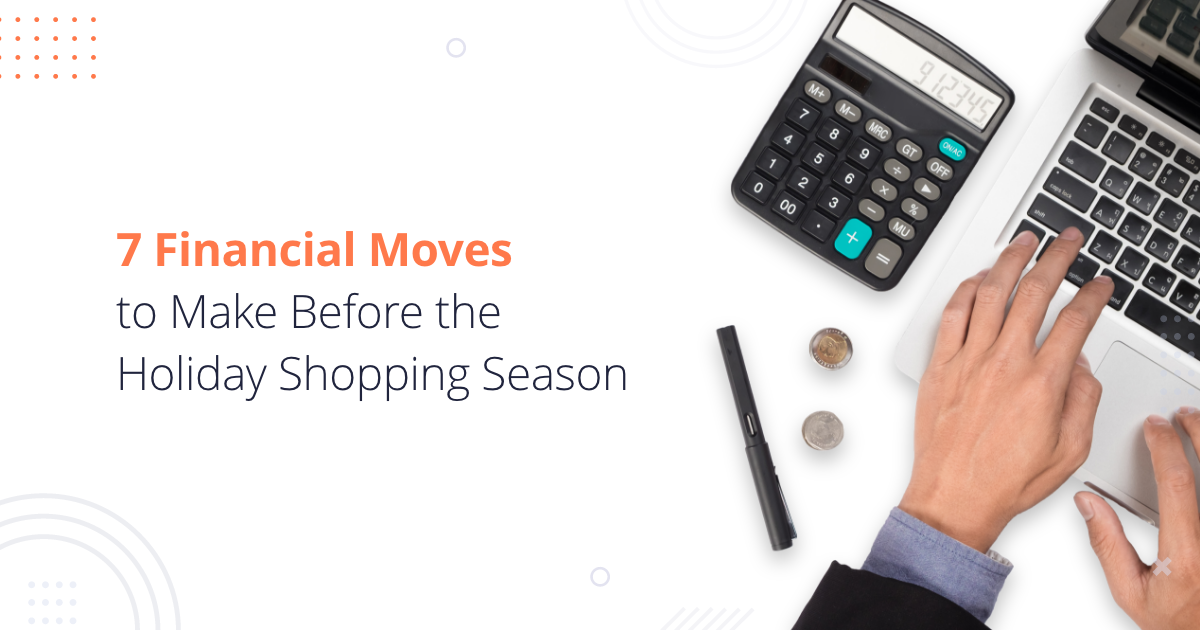
7 Financial Moves to Make Before the Holiday Shopping Season
Contents
The holidays are fast approaching, even if they’ll look different this year. Brick-and-mortar stores are focusing on online sales, and ecommerce-exclusive sellers are seeing a surge of new customers. The experts at Retail Info Systems predict that ecommerce sales will grow 25-35% year-over-year during the 2020 holiday season. Get ready, sellers.
Though there will be some changes to how we celebrate the holidays this year, the “to do” lists for small businesses remain the same. Keep reading for timeless tips on money moves you should be making before the holiday season.
Analyze Your Cash Flow
The natural starting point of planning for the holiday season is analyzing your current and past cash flow. Take a look at last year’s numbers to determine:
- Which shopping days were your busiest?
- How much did your business earn during the holidays?
- What expenses should you expect to incur again?
Looking back on past holiday seasons gives you a more vivid picture of your cash flow history so you can begin preparations for the upcoming rush. What is your projected revenue? Do you have new marketing campaigns in place, and can you afford to increase your spend? Which items need to be restocked so you have enough for the rest of the year? These are all critical questions to ask yourself early on.
Finally, take a look at your January sales to see how much your operations will likely slow down after the holidays. If there’s a noticeable slump on the way, you can make adjustments to avoid any cash flow hiccups early next year.
For a more in-depth explanation of cash flow, check out this helpful article from our friends at QuickBooks: The Beginner’s Guide to Cash Flow.
Stock up on Inventory
Inventory and cash flow go hand-in-hand when you’re selling online. After all, your revenue depends on moving those products, and hopefully, you can move most of them during the holiday season. The key is to buy enough to last through the end of the year so even the last-minute shoppers can make purchases—but not so much that you’re paying for extra warehouse space during the subsequent slower months.
Several ecommerce businesses finance their inventory purchases ahead of the holidays, which is an option to consider if your cash flow statement shows greater expenses than cash reserves. If that’s the route you’re taking, be sure your books are up to date before approaching a lender. Accounting software makes this faster and easier while also improving accuracy.
Plan for Extra Payroll
Whether your ecommerce business employs just a handful of people or a full team, it’s wise to plan for extra payroll expenses during the holidays. The 2020 holiday season may be the year when you need seasonal employees to keep up with the workload (Congratulations!), or you hire contractors to freshen up your website.
Even without extra hands on deck, you’ll need additional payroll for employee bonuses. It’s a great way to reward your team for their hard work, and the morale boost will inspire everyone to finish the year strong.
Budget Based on Your Findings
After you’ve done your research and can map out your upcoming holiday season, it’s time to create a budget based on your findings. You already have an educated guess—your forecast—based on patterns and trends from previous years. Now you can incorporate your goals and build an actionable plan.
Your budget should show your fixed expenses, anticipated expenses, and projected revenue. It should also help you avoid overspending during the holidays when it’s easy to get caught up in the festive atmosphere.
Though it seems counterintuitive, create a budget knowing that you may have to be flexible. For example, if your products are best suited to the summer months, the holidays may be a slower time for your business. It’s in your best interest to rework your budget, scale back operations, and turn your focus toward the sales you’ll make in the spring when customers are looking forward to summer. While many businesses experience chaos at the end of the year, you can focus on infrastructure and head into the new year refreshed and ready.
Create a Contingency Plan
Picture this: You’ve forecasted, budgeted, and prepared for the holiday rush, but then a crucial piece of equipment breaks or your vendor’s prices skyrocket due to a raw material shortage. If you don’t have an emergency fund or access to capital to solve the problem, your business could be on thin ice. This is why it’s important always to have a contingency plan to pay for unexpected crises.
Think of your contingency plan the way acrobats think of their safety nets. Your savvy and your careful planning are most likely to get you through the holiday season without any issues, but your contingency plan is your peace of mind.
Revisit Your Credit
Credit isn’t something most of us think about until it’s time to seek funding, but it can make a major impact on your success rate when you do need extra cash. A good credit score will not only make it easier to secure a business loan or a line of credit, but it will also give you access to lower interest rates and more money overall. That way, you can take advantage of limited-time offers like deeply discounted inventory or high-reward investment opportunities to spur business growth.
If your credit score could use some work, start with paying your bills on time. Pay more and pay early when possible, and check in often to make sure your lender(s) are reporting to the major credit bureaus.
Get Your Taxes Prepped
Time flies when you’re managing your online store during the holidays, and tax season will arrive before you know it. Avoid the last-minute scrambling by tracking down all your documents now so your business can reap the rewards in the new year. If you hired seasonal employees, make sure you have all their W-4 forms, plus the W-2s from your year-round team. If you made a charitable donation, get a written record of it.
You can also automate your day-to-day accounting tasks by auto-syncing your online store to QuickBooks. Getting everything entered into your accounting system ahead of time makes filing taxes a breeze, even though it’s so soon after the chaos of the holidays.
By guest contributor Taylor Knauf
Monika Tripathi is a Sales Director at Webgility. She excels in driving revenue growth, building high-performing teams, and developing strategic partnerships across global markets.



.png?width=56&height=56&name=image%20(2).png) Monika Tripathi
Monika Tripathi




